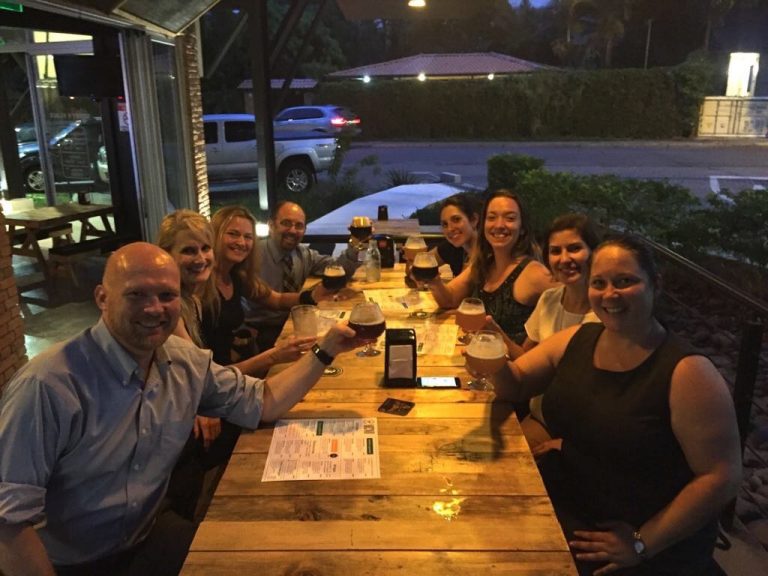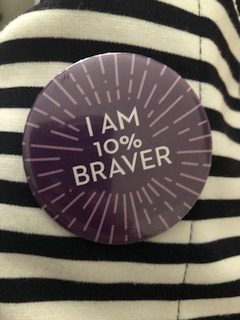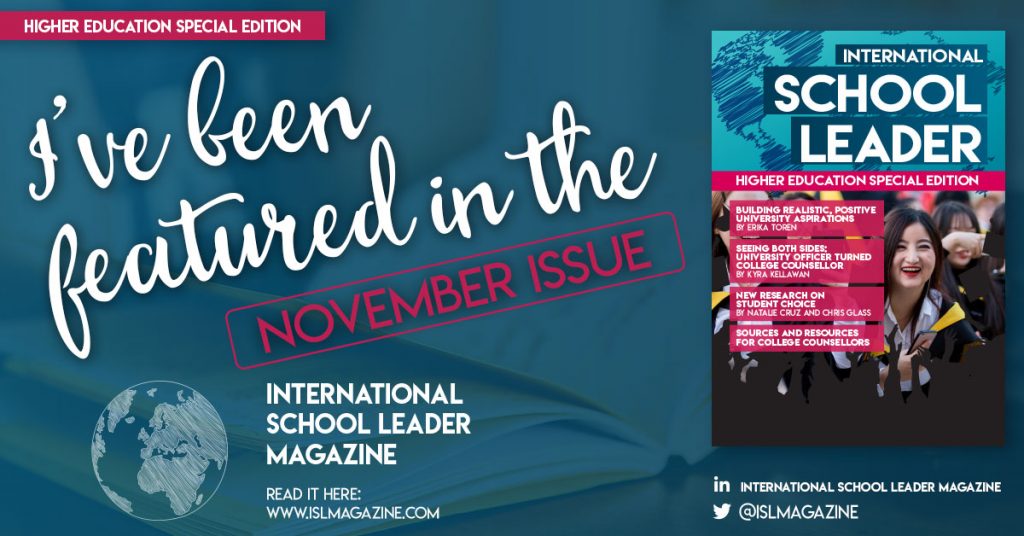
This article was written for an interview with International School Leader magazine, describing my journey from University International Officer to College Counselor (around a series of questions posed by the magazine editor). I have to say it was really fun to write! You can read each new issue of ISL Magazine online here: https://www.islmagazine.com/
Can you briefly describe your career experience, as both an international officer at Kings College and more recently, working as a college counselor?
I started out as an international admissions counselor for a tiny US liberal arts college in London in 2007, travelling to international schools in Europe and North Africa. It was my first taste of international student recruitment, and upon realising there was a supportive network of admissions reps and college counsellors who worked together to place students in the place that was right for them – I quickly knew I loved it. I moved into a similar IO role at King’s College London the following year. Over 6 years at King’s I saw international recruitment change rapidly: policy changes in everything from visas to government funding, and tuition fee rises. I travelled extensively in Europe and Asia and came to understand how vital the school counsellor’s role was to our work. After 7 years of road-warrior life, a great first-counselling-job opportunity came up at the French Lycée in New York City. My dual US citizenship and UK university knowledge (and a smattering of French) made me a good fit, and I was lucky to have an experienced boss who invested in my professional development. I learned much about US college admissions there. That in turn helped me gain my next role at the United World College in San Jose, Costa Rica, working with the most diverse group of amazing students, through to my current role setting up the University Counseling Office at Aloha College in Spain.
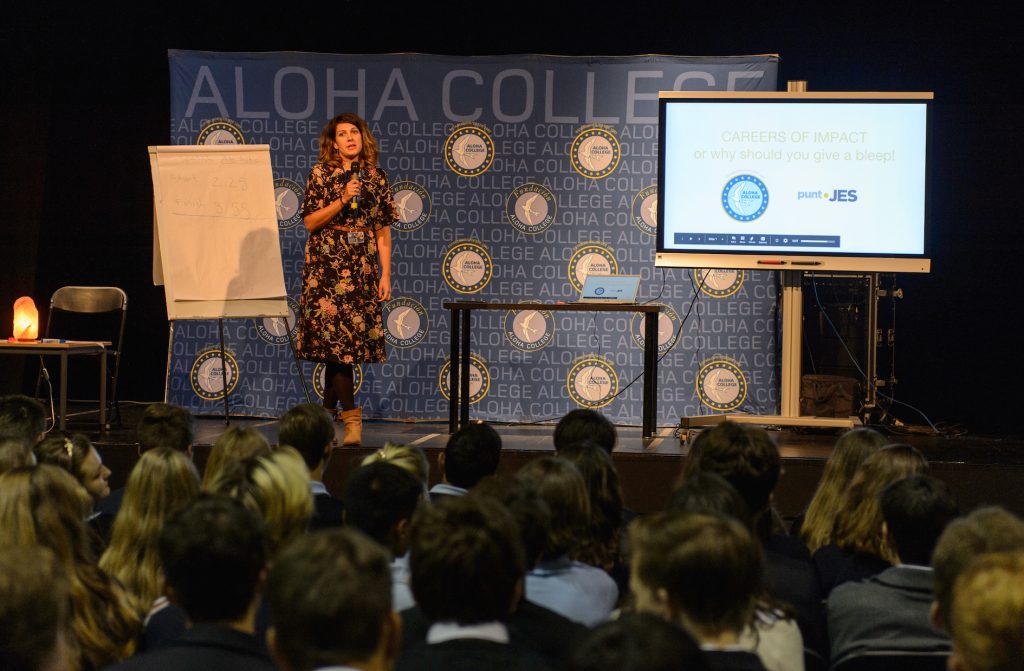
What aspects of your time working as a university international officer have most helped you in your current role as an international school college counsellor – how and why?
I think that being an international officer helped a lot in terms of knowing what a selective university was looking for in its applications. I travelled often with IOs from UCL, Imperial and LSE, and we said the same things to students about how to make their applications stand out in a very crowded field. Having given regular talks on writing personal statements, understanding that there are helpful ways to measure how “good” a course, or a university’s teaching is (from the inside), has helped me inform families on making better choices for them using hard statistics and comparative data rather than just league tables or worse, hearsay.
Working in a large university’s international office also gave me plenty of insights into things students don’t always know: like how some courses under-recruit in certain regions and therefore have more places; how the name of a course can affect how competitive it is; the different types of assessments universities employ in different degree structures, etc. This is all helpful information to keep my students from bunching together to apply for the same degrees at the same institutions, and I try to help them to focus on important things like teaching and research quality, resources available, and employment rates after graduation.I also know first-hand the role we often had as international officers to help change or adapt admissions criteria for different regions, and I am definitely able to see through the “marketing-speak” to help students ask critical questions about the investment they are about to make.
Can you provide some practical solutions, based on your experience understanding both roles (university recruitment and college counselling), that you can share with the college counsellors of other international schools who don’t have the benefit of such experience?
You can advocate for your students by ensuring the school is positioned appropriately in your region. For example, working collaboratively with other schools to hold fairs or welcome visits to your city or region is a surefire way to attract more universities to be interested in your students. I find that the more memorable or unusual your school event, the better: at the Lycée each year the students ran the Fête Française – a French food-and-cultural themed college fair, that gave out (nice) goody bags to reps: it was always oversubscribed, unsurprisingly!
The importance of visibility cannot be stressed enough: both of you as a counsellor at international conferences and university tours and visits, but also of your school, in terms of your profile, grade averages and application statistics, must not be underestimated. In some college admission processes, having that personal relationship with the admissions rep and being able to have frank and professional conversations can support your students in the best possible way and foster important relationships with tertiary institutions.
It is also helpful, practically, to understand when colleges are going to be travelling nearby for other events and to plan your own school events around their travel schedules. Keep a network of college reps you can rely on to help you know when and why they travel and say yes to some events/schools and no to others.Finally, ensure that you speak up and advocate for the challenges our own students face: helping universities understand if their requirements are unreasonably high or complex, if they can market themselves more effectively to your students, or just letting them know what really worked, can bolster your reputation as a counselor who is helpful, knowledgeable and worth taking time for – and for your students, that pays off.
What do you consider to be the biggest challenges of international school college counselors today?
As international school numbers continue to grow and student destinations become ever-more diverse in a globalised world, many counselling offices are not resourced accordingly in terms of staff. Counselors in many ways have to do more with less: we have to know about more university application systems in different countries, welcome more visitors to campus, write more letters of recommendation, and meet with more students and parents, but with less and less time, and more emails than ever to reply to.In every international school I have worked in, time is a luxury that many counselors do not have. Therefore, it is important that they are given the freedom, flexibility and support to fulfil often demanding, time-consuming administrative tasks. Some school systems work actively to support this – for example by investing in software and systems to ensure communication between counselor and students/colleges is manageable. Assigning counsellors administrative support, especially at peak times of the year when files must be checked and transcripts and letters of recommendation must be submitted, is both sensible and essential. A second pair of eyes is a simple must when proofing and checking letters and documentation sent out on behalf of a school: whether they come from a registrar, head of secondary or assistant counselor.
Universities, too, can assist in the work that counsellors have to do by adjusting their policies to be simply more student-led: for example, some US colleges now allow students to self-report their SAT scores, or upload their own unofficial transcripts, and the Dutch application route is particularly counselor-friendly, with usually no accompanying letters of recommendation required. Tuition fees, too, are on the rise in most of the university systems our families prefer: we see first-hand how the steady increase of the cost of applying to university, and all of the preparation entailed within, is becoming a barrier to many families.
Finally, this generation of students have seen stress levels and mental health issues rise to previously unseen levels. Pressure to “keep up”: with their peers, with their parents’ expectations, with schoolwork and too many extra-curricular commitments (done just for the college application) is pushing some young people, their parents, and their counselors in return, into a kind of results-driven frenzy. The best school leaders aim to produce balanced, responsible young people, who can both cope with failures and learn from them as well as own their achievements. For that to happen, a culture of appreciation and celebration of each student’s individual attributes needs to exist, rather than measuring all student “success” with the same yardstick. It’s worth remembering that when asking the school counsellor only about the successes at Oxbridge or the Ivy League universities in a given year, as that culture is created and fed by us too.
You mention in your feature ‘Learning to Open Doors’ that many staff are too busy or too underfunded to attend conferences like EduFest Le Rosey. Even in many international schools, this is true. What messages would you like to send to international school leaders about providing their college counsellors with the resources they need to be able to support students in the best possible way.
I would echo the comments I made above about having adequate time to do the job well. To have a successful school counselling department with proven results, you need to ensure your staff have the time and resources to advocate properly for your school and your students. A mentor of mine in a very-well known Swiss school once said that “college counselling is a job done three-quarters inside school gates, but at least a quarter of the role is done outside ‘in the field’.” Well-informed counsellors who know a broad range of options, understand different admissions cycles, and are well-connected with admissions officers are counsellors who belong to associations, have time to go to conferences and who also visit a wide variety of college campuses regularly. Those are the same counsellors who also have in-school support with writing letters and sending documents.
So, for heads and leaders of international schools: If you want those applications leaving your school to be of the highest quality, then ensure you are not overloading your counselling team with unnecessary or unwanted teaching, extra duties, emails or reporting and allow the folk who make it our business to know our students inside and out – get on with their job of making the strongest possible cases for them to access the universities they hope to attend.
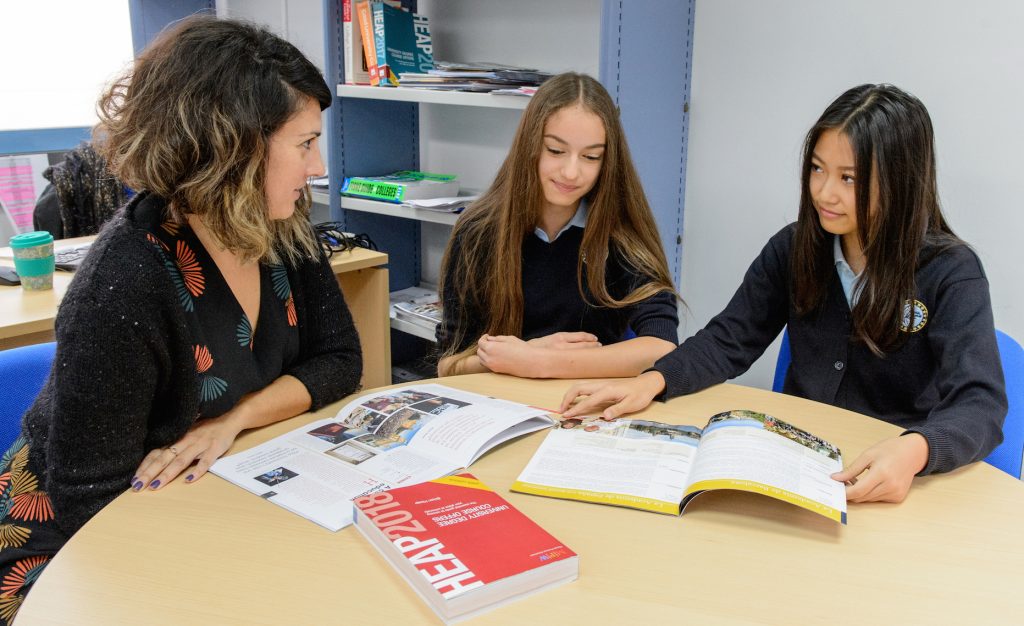
Do you have any recommendations for universities and/or for representative bodies of universities from key countries about how they could better support the needs of international school college counsellors individually and/or in collective groups?
Yes! Making the application process simpler; adhering to common deadlines, and ensuring things like technological systems really work to support students and counselors is key. The UCAS system, despite some flaws, is one of the most appreciated worldwide for its simplicity: a letter and grades are uploaded after the student has completed the application, and everything that student and counselor writes is seen by all of their universities. Holland’s Studielink is a completely student-driven process, however when students have a technological issue, they find it difficult to get it rectified quickly or find a contact, and inevitably they come to my office for help. Small improvements made to application technologies go a long way, and if colleges can make it easy for us to send documents electronically, the relief from administrative burden is great.
Indeed by making intentional decisions to support and facilitate applications from international school students – for example, by going test-optional in the admissions process – colleges recognise the extra hurdles international kids already have in terms of studying demanding national curricula, taking extra exams in English, undergoing interviews, and generally researching the culture and customs of the countries they are applying to: navigating foreign jargon and costly, oftentimes baffling processes. For counselors working with international students, assist us with giving relevant information as early as possible to help them feel more relaxed and prepared. If you already know that fees or scholarship policies will change, or visa regulations are going to become more difficult, please be honest about that as far in advance as you can. It helps us ensure those students are placed correctly and builds trust with institutions and systems.
Are there any particular international officers, universities, or university bodies that are particularly good examples of meeting the needs of international school college counsellors? What are they doing that makes them stand out for their best practice?
There are a few universities who are very active in the networks of international counselling professional bodies such as IACAC and the Council of International Schools. They are usually the ones presenting first on policy changes or leading a charge to improve something. Paul Teulon made a huge effort at King’s early in his role as Director of Admissions to change the IB requirements and make them fairer, and this not only showed international schools that we understood the IB for the merit of its components, weighing HL subjects differently, but it increased applications from international schools by a significant number. A win-win. People who give their time to contribute to boards of these institutions are usually very active on social media, and there are a few university representatives I can think of who are always great at being knowledgeable presences: Holly Smith at Sussex, Denise Nijhuis at University College Roosevelt, Kim Zwitzersloot at University College Utrecht, and David Bernay at St.Edward’s University all come to mind as “first responders” to important questions.
Many US colleges have made it their business to have personal relationships with counselors, inviting us to get coffee, or dinner, when our schedules permit. The kinds of discussions you can have away from the desk are always different, and I have to say the personal approach always helps to keep a college at the forefront of our minds. Some universities like La Verne and Trinity College Connecticut stand out for their personal, warm, email communications, that bridge the gap of being full of useful information and not too long to read, nor sent too often. Reed College and Lewis and Clark in Portland stand out for being two of the best summer college visits I have had in awhile. The universities who host exceptionally well-organised counselor tours, like the BEANS group in Boston, or the Chicagoland tour after the IACAC conference, stand out for their truly professional approach: you leave tours like these feeling you have a new network of professional friendships and that you know more thoroughly what students would “fit” their institutions.
Finally, I think that the colleges who really gain traction with international students are the ones who show that they care about them. I had a student choose one UK university over another (more highly ranked one) because their on-campus welcome during their open day was warmer, and their communications at offer-holder stage made the student feel genuinely valued.
For me, it’s a very simple, human need we all have: to be seen, valued and understood, and the colleges who recruit ethically, consciously and with a personal touch are by far the ones who win the best, most engaged students.
